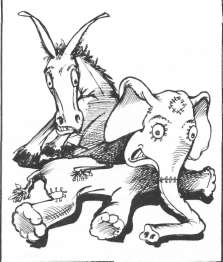 |
Home | Search | Browse | About IPO | Staff | Links |
 |
Home | Search | Browse | About IPO | Staff | Links |
|
The Day the Democrats Stole the House From out of the past the thundering gavel of Paul Powell  1981 DOES not mark the first time the majority party has lost a powerful leadership post in the General Assembly. The first time was 1961, when the legendary Paul Powell was elected to his third and final term as speaker of the House. In the 1960 fall election, the Republicans had snagged control of the House by one seat, 89-88. But the Republicans were divided, and it took several caucus ballots to nominate Chicago Rep. William Pollack for speaker. Six Republicans didn't even bother to show up. The Democrats, however, were united. There was never any doubt who their leader was: Paul Powell of Vienna, who was speaker in 1949-50 and in the preceding 1959-60 session. As prescribed in the state Constitution, Secretary of State Charles Carpentier convened the House at noon, Wednesday, January 4, to preside over the election of a speaker. But the attendance roll call showed six absentees: five of the 89 Republicans and one of the 88 Democrats. The Republicans moved to adjourn. The Democrats demanded a roll call vote, but Carpentier allowed a voice vote. He ruled that the motion passed, adjourned the House and walked out. So did all the Republicans.
"Whereupon," the House journal says, "by unanimous consent Rep. Paul Powell assumed the chair . . . ." Rep. Alan Dixon moved that Powell be named temporary presiding officer and the motion passed 88-0. The Democrat reconsidered the Republicans' adjournment motion and all 88 voted not to adjourn. Dixon called for the election of a temporary speaker. Powell called Dixon to take over the chair. Dixon opened nominations; Powell was the only nominee; Dixon closed nominations; Powell was temporary speaker, 88-0. A final 88-0 vote made Powell permanent speaker. By 4 p.m. the Democrats had adjourned and gone home with the speaker's gavel. The Republicans filed suit in Sangamon County Circuit Court, but the case was dropped when a deal was cut. In the meantime, the House met twice on succeeding days, but nothing happened. Then, on Monday, January 9, Powell convened the House, and the attendance roll call showed 89 present: all 88 Democrats plus Rep. Walter "Babe" McAvoy, one of the five Republicans who had been absent January 4. Powell announced a quorum. According to the House journal, Powell then addressed the Democrats and McAvoy. "The best interests of the government in Illinois require that the parties reach an accord on the dispute concerning the organization of the House .... It is essential that the controversy be resolved so that there will be no cloud cast as to the constitutionality of any legislation that we may consider and pass .... Being mindful of our responsibility, therefore, an accord has been reached, by the terms of which I shall now relinquish the gavel to the Secretary of State for the purpose of permitting the Secretary of State to conduct the election of a temporary presiding officer, at the conclusion of which the Secretary of State will relinquish the gavel to the officer so chosen, who will proceed with the organization of the House . . . ." Carpentier took the chair, gaveled the House to order, called the roll and announced a quorum. McAvoy was sworn in. By that time Rep. August Ruf and Rep. Michael Zlatnik, two more Republicans who had been absent January 4, had arrived. They were sworn in along with Rep. Kenneth Wilson, the lone Democratic absentee January 4. That brought attendance to 91. Carpentier proceeded to the election of a temporary speaker; Powell was the only nominee. All 88 Democrats and McAvoy voted for Powell; Ruf and Zlatnik voted present. Powell took the chair back. By this time a number of other Republicans had come onto the floor, bringing attendance to 167. The Democrats called for the election of a permanent speaker. Powell called Dixon to the chair; Dixon opened nominations. The Democrats nominated Powell; the Republicans nominated Pollack. Dixon closed nominations, but several members called for a roll call vote. That showed 127 in favor of closing nominations, 38 against and 2 present. More Republican arrivals brought the total to 175 of the 177 House members. Dixon proceeded to the election of a permanent speaker. The vote was Powell 89, Pollack 85, one voting present. Powell then had been reelected by a majority of those elected — and duly sworn in. Powell had originally been elected speaker January 4 by majority of those present and voting, rather than the customary majority of those elected — 89 of the 177 House members. The House journal does not show the Democrats ever cited the 1955 opinion by former Attorney General Latham Castle, a Republican. This attorney general opinion (which was cited by Gov. James R. Thompson on January 15, 1981) held that a majority of House members present could elect a speaker unless House rules required more. Ironically, it was Carpentier who had originally requested Latham's opinion in 1955 when he presided over the election of Republican Warren Wood to his third of four record-breaking terms as speaker. March 1981/Illinois Issues/9 |
|
|